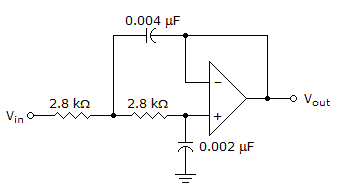Discussion
Home ‣ Electronics ‣ Basic Op-Amp Circuits See What Others Are Saying!
- Question

The given circuit is a two-pole, active ______ filter.
Options- A. high-pass
- B. low-pass
- C. band-pass
- D. band-stop
- Correct Answer
- low-pass
- 1. A high-pass filter heavily attenuates the higher frequencies.
Options- A. True
- B. False Discuss
- 2. A capacitor stores electric energy in the form of an electric field.
Options- A. True
- B. False Discuss
- 3. A 555 timer can be configured as an astable multivibrator.
Options- A. True
- B. False Discuss
- 4. How many buses are connected as part of the 8085 microprocessor?
Options- A. 2
- B. 3
- C. 5
- D. 8 Discuss
- 5. Logic gate circuits contain predictable gate functions that open their outputs.
Options- A. True
- B. False Discuss
- 6. A reverse biased diode will act as an open switch.
Options- A. True
- B. False Discuss
- 7. A transducer does not convert energy from one form to another.
Options- A. True
- B. False Discuss
- 8. What is the standard TTL noise margin?
Options- A. 5.0 V
- B. 0.2 V
- C. 0.8 V
- D. 0.4 V Discuss
- 9. The total resistance of a series circuit always depends on the highest value resistor in that circuit.
Options- A. True
- B. False Discuss
- 10. A transistor used in a digital circuit will have two operating states, which are cutoff and saturation.
Options- A. True
- B. False Discuss
More questions
Correct Answer: False
Correct Answer: True
Correct Answer: True
Correct Answer: 3
Correct Answer: False
Correct Answer: True
Correct Answer: False
Correct Answer: 0.4 V
Correct Answer: False
Correct Answer: True
Comments
There are no comments.More in Electronics:
Programming
Copyright ©CuriousTab. All rights reserved.
